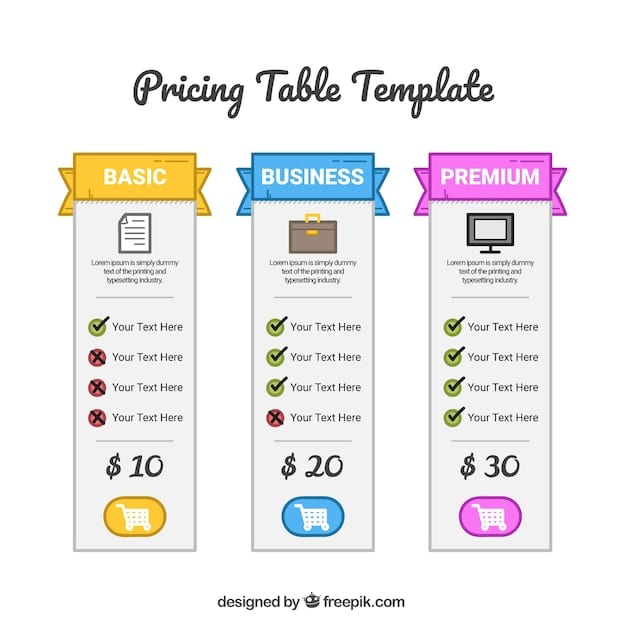Bitcoin Futures: Your Guide to Trading on US Exchanges

Bitcoin futures allow traders in the U.S. to speculate on Bitcoin’s price without directly owning the cryptocurrency, offering a regulated environment for both hedging and potentially amplifying investment returns through leverage on exchanges like CME and Bakkt.
Want to get involved in crypto trading but unsure where to start? Then discover all about **Bitcoin futures: How to trade them on US exchanges**, a regulated way to speculate on Bitcoin’s price movements, providing opportunities for both seasoned traders and those new to cryptocurrencies.
Understanding Bitcoin Futures
Bitcoin futures represent a contract obligating buyers to purchase or sellers to sell Bitcoin at a predetermined price and date. These futures contracts are traded on regulated exchanges in the United States, such as the Chicago Mercantile Exchange (CME) and Intercontinental Exchange (ICE), which offers Bakkt.
Trading Bitcoin futures can be complex. Here’s a breakdown of what makes them unique for traders in the US:
What are Bitcoin Futures?
Bitcoin futures are derivative contracts, so their value is derived from the underlying asset, in this case, Bitcoin. Instead of buying or selling actual Bitcoin, you are trading a contract that represents the price of Bitcoin at a specified future date.
Key Benefits of Trading Bitcoin Futures
One of the main benefits of trading Bitcoin futures is the ability to speculate on the price of Bitcoin without actually owning any of the cryptocurrency. This is especially useful in volatile markets where holding Bitcoin directly could be risky.
- Leverage: Futures contracts allow traders to control a large position with a relatively small amount of capital.
- Hedging: Traders can use futures to hedge against potential price declines in their Bitcoin holdings.
- Regulation: Regulated exchanges provide a more secure trading environment compared to unregulated crypto exchanges.
In essence, understanding Bitcoin futures involves knowing that these contracts provide a regulated and leveraged way to participate in Bitcoin’s price movements without direct ownership, making them a strategic tool for both speculation and risk management.
US Exchanges That Offer Bitcoin Futures
The availability of Bitcoin futures on US exchanges is regulated, offering a safe haven for traders. Let’s explore the leading exchanges where US residents can trade Bitcoin futures.
The primary regulated venues where you can participate in Bitcoin futures trading include:
CME (Chicago Mercantile Exchange)
The CME was one of the first regulated exchanges to launch Bitcoin futures contracts. It is a good choice for institutional investors and experienced traders looking for a regulated environment with high liquidity.
Bakkt (Intercontinental Exchange)
Bakkt offers physically-settled Bitcoin futures, meaning the contract is settled in actual Bitcoin rather than cash. This appeals to investors seeking direct exposure to Bitcoin without the hassle of self-custody.

Choosing the right exchange depends on your trading style and preferences. CME caters to a more institutional crowd, while Bakkt aims to engage a broader range of investors with its physically-settled contracts.
Opening a Bitcoin Futures Trading Account
To trade Bitcoin futures on US exchanges, the first step is to open a trading account. This process generally involves several key steps to ensure compliance and security.
Becoming a Bitcoin futures trader starts with opening an account. The basic steps are:
Choose a Broker
Select a futures broker that offers access to the exchange you wish to trade on (e.g., CME or Bakkt). Ensure the broker is registered with the Commodity Futures Trading Commission (CFTC).
Complete the Application
Fill out the broker’s application form, providing personal details, financial information, and investment experience. Be prepared to undergo a Know Your Customer (KYC) verification process.
Fund Your Account
Deposit the required margin into your account. This is the amount of capital you need to control a futures contract. The margin requirements will depend on the broker and the contract’s specifications.
- Review Broker Reputation: Check online reviews and regulatory records to ensure the broker has a solid reputation.
- Understand Margin Requirements: Be aware of the margin requirements and the risks of leverage.
- Ensure Regulatory Compliance: Make sure the broker is CFTC-registered to comply with US regulations.
Opening a trading account requires due diligence and a deep understanding of regulatory compliance. By choosing a registered broker and understanding margin requirements, you can navigate the process more effectively.
Strategies for Trading Bitcoin Futures
Trading Bitcoin futures involves employing strategies that align with your risk tolerance and investment objectives. Let’s explore some strategies tailored for Bitcoin futures trading on US exchanges.
Effective strategies are critical for success. These include:
Hedging Strategies
If you hold Bitcoin, you can use futures contracts to hedge against potential price declines. By selling Bitcoin futures contracts, you can offset losses in your Bitcoin holdings if the price drops.
Speculative Strategies
Speculators aim to profit from Bitcoin’s price movements. If you believe the price of Bitcoin will rise, you can buy futures contracts (go long). If you anticipate a decline, you can sell contracts (go short).
Arbitrage Strategies
Arbitrage involves exploiting price differences between different exchanges. If there’s a discrepancy in the price of Bitcoin futures between two exchanges, you can simultaneously buy and sell contracts to profit from the difference.

Effective trading strategies in Bitcoin futures involve various approaches such as hedging, speculating on price movements, and arbitrage, each designed to leverage the unique characteristics of the Bitcoin futures market.
Risk Management in Bitcoin Futures Trading
Risk management is paramount when trading Bitcoin futures due to the volatility and leverage involved. Let’s explore essential practices for mitigating risks in this arena.
Successful risk management includes:
Stop-Loss Orders
Always use stop-loss orders to limit potential losses. A stop-loss order automatically closes your position when the price reaches a predetermined level.
Position Sizing
Control the size of your positions to avoid overexposure. A general rule is to risk no more than 1-2% of your trading capital on any single trade.
Diversification
Diversifying your trading portfolio across different assets can help reduce the overall risk. Don’t put all your capital into Bitcoin futures.
- Monitor Market News: Stay updated on the latest news and developments in the crypto market.
- Stress Test Your Strategies: Simulate different market scenarios to test the resilience of your trading strategies.
- Seek Professional Advice: Consult with a financial advisor if you are unsure about any aspect of futures trading.
Effective risk management in Bitcoin futures trading involves setting stop-loss orders, carefully sizing positions, and diversifying portfolios, along with diligent market monitoring and professional consultation.
Tax Implications of Bitcoin Futures in the US
Understanding the tax implications of trading Bitcoin futures in the US is crucial for compliance and financial planning. Let’s explore how Bitcoin futures are taxed under US law.
US tax laws play an important role for traders. The tax implications include:
IRS Regulations
The IRS classifies Bitcoin futures as Section 1256 contracts. This means they are subject to a special tax treatment known as the 60/40 rule.
60/40 Rule
Under the 60/40 rule, 60% of your gains or losses are taxed as long-term capital gains, regardless of how long you held the contract. The remaining 40% is taxed as short-term capital gains.
Wash Sale Rule
The wash sale rule applies to futures trading. If you sell a futures contract at a loss and repurchase it (or a substantially identical contract) within 30 days, the loss may not be deductible.
Tax implications require an understanding of IRS regulations, the 60/40 rule for gains and losses, and the wash sale rule, all of which are critical for US traders to maintain compliance and optimize their tax strategies.
| Key Aspect | Brief Description |
|---|---|
| 💡 What is it? | Contract to buy/sell Bitcoin at a future date/price. |
| 🏛️ US Exchanges | CME and Bakkt are regulated exchanges. |
| 🛡️ Risk Management | Use stop-loss orders and diversify. |
| 💸 Tax Implications | Subject to 60/40 rule: consult a tax advisor. |
Frequently Asked Questions
▼
Trading Bitcoin futures allows you to speculate on bitcoin’s price without owning it, use leverage, hedge against price declines and trade in a regulated environment ensuring some level of safety.
▼
The primary US exchanges offering Bitcoin futures are the Chicago Mercantile Exchange (CME) and Bakkt, which is part of the Intercontinental Exchange (ICE). They provide regulated trading environments.
▼
Bitcoin futures are taxed as Section 1256 contracts under IRS, subject to the 60/40 rule. 60% of gains/losses are taxed as long-term capital gains with the rest as short-term gains.
▼
The 60/40 rule means 60% of the Bitcoin futures gains/losses is taxed as long-term capital gains, while 40% is taxed as short-term capital gains. This applies regardless of contract holding duration.
▼
Beginner-friendly strategies include stop-loss orders to reduce risk, small position sizes to avoid overexposure, and portfolio diversification to reduce risks. Professional financial advice is recommended.
Conclusion
Trading Bitcoin futures on US exchanges offers unique opportunities and challenges. By understanding the underlying mechanisms, regulatory landscape, and risk management strategies, traders can navigate this market effectively and strategically. Staying informed and cautious is key to success in the world of Bitcoin futures.





